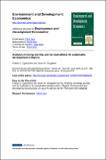UNNSpace Repository
Analysis Of Energy Poverty And Its Implications For Sustainable Development In Nigeria
- UNNSpace Home
- →
- Faculty of Social Sciences
- →
- Staff Publications
- →
- Articles
- →
- View Item
JavaScript is disabled for your browser. Some features of this site may not work without it.
| dc.contributor.author | Ogwumike, Fidelis
|
|
| dc.contributor.author | Ozughalu, Uche
|
|
| dc.date.accessioned | 2018-06-04T13:16:31Z | |
| dc.date.available | 2018-06-04T13:16:31Z | |
| dc.date.issued | 2015-08-19 | |
| dc.identifier.citation | Ogwumike, F.O., Ozughalu, U. M. (2015) Analysis Of Energy Poverty And Its Implications For Sustainable Development In Nigeria; Cambridge University Press, Environment and Development Economics 21: 273–290 | en_US |
| dc.identifier.uri | http://repository.unn.edu.ng:8080/xmlui/handle/123456789/7039 | |
| dc.description.abstract | This study estimates and analyzes the incidence and determinants of energy poverty in Nigeria based on a simple multidimensional energy poverty index that it constructed. It also highlights the implications of energy poverty for sustainable development in Nigeria. The headcount ratio and the logistic regression technique are used. The study utilizes the Nigeria Living Standard Survey data set of 2004, obtained from the National Bureau of Statistics. The estimates show that energy poverty is pervasive in the country; it afflicts over 75 per cent of the population. The determinants of energy poverty in Nigeria include household size; educational level, gender and age of household head; general poverty; region of residence; and proportion of working members in the household. Efforts should be made to adequately tackle the problem of energy poverty in Nigeria. This is a major way to put the country on the path to rapid and sustainable development. | en_US |
| dc.language.iso | en | en_US |
| dc.publisher | Cambridge University Press | en_US |
| dc.subject | energy poverty, logistic regression technique, sustainable development. | en_US |
| dc.title | Analysis Of Energy Poverty And Its Implications For Sustainable Development In Nigeria | en_US |
| dc.type | Article | en_US |
Files in this item
This item appears in the following Collection(s)
-
Articles [94]
